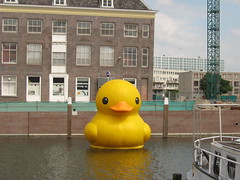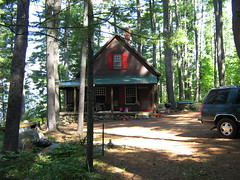So now I am again visiting the Netherlands for the research and talks I mentioned earlier. I have been at the University of Twente visiting the Information Systems and Change Management (IS & CM) department, which is where I gave my talk, yesterday. It is quite interesting because when Elfi invited me I at first wasn’t sure how my research on Facebook would be relevant to the work she and her colleagues are doing, but actually, there is a surprising amount of overlap in the questions we are investigating. So the talk went well and also helped me to further refine my thinking about how participation in Facebook is affecting professional, in this case specifically scholarly communities.
A couple of points on that:
- Communication on Facebook leads to a greater feeling of co-presence (basically the feeling of being with someone) and it assuges the discomfort of asence (the feeling that we exist only in the process of communication, so we are always flickering in and out of existance). So, when academics get to know each other via Facebook, they may connect more quickly and more solidly–though this of course depends on how they use it, which leads to the next point.
- This increased connection seems linked to a more playful use of Facebook in which people allow the border between the personal/casual and the professional/formal to blur. Of course that makes sense; if we think someone is being more casual and personal, we feel we are seeing a more authentic self, that we know them better. In fact, slightly inappropriate behavior adds to this because we assume it is less calculated. I mean, who would behave in a way that was professionally inappropriate on purpose? (Of course this could be equally calculated, but I think most people don’t imagine others treat every online action as if it were a move in a game of chess).
- But even if someone is not deliberately offering an image that is somehow distorted, distortion is inevitable because no one can put every detail that might be observed by somone physically proximal into a facebook page (or into a blog, or homepage, or what have you). So people always must choose what to include.
- Possibly Facebook feel more authentic though (and maybe it actually is) because when someone is addressing several different audiences–close friends, family, colleagues, other communities to which she belongs, she cannot address all of them at once. So some actions or posts or status updates are aimed more at one group or another, but everyone may see them. So it may be that Facebook does offer a more rounded or more integrated picture. But as privacy controls improve and as more people use them to filter the content the present to each group, this complete picture maybe be fragmented–hard to predict.
So those are some of the ideas I am thinking about, and now the question is how to gather data on them, since most facebook profiles are closed to non-friends, but I can hardly make any claims based only on what I see my own friends doing.
So, back to the visit; I had two very nice dinners, first at De Kater, where I had some amazing salmon stuffed with shrimp, and the next night at Sam Sam, where I had duck breast that was quite good too. While at Sam Sam I also tried a drink that combined beer and Sprite, and that was a little weird, but ok.
Silly to mention the food in the middle, but it was very good…. Anyway, I met a lot of nice people in the IS & CM department who are all working on interesting stuff. I won’t put all the individual links in with the names; they can be found through the department page linked above. But I enjoyed speaking at length with Bjorn Kijl, Michel Ehrenhard, Romana Aziz, Roland Muller, and of course Elfi. Also I had a very interesting talk with the head of the department, Jos van Hillegersberg, and I spoke a lot with Celeste Wilderom who was also hosting me at her house. Everyone has statements about their research on their homepages, though I’m not sure it’s all up to date, but anyway, some of them are looking at social networks in ways that relate to my work with Facebook, and some lokk at organizational change and communication, among other things. That actually has some connections to my other project on the institutionalization of new media in the Netherlands. I am looking at new media groups rather than business, but many of the issues are similar, particularly because now ICTs have such a strong effect on everything.
Staying with Celeste was a treat–she has a very nice house! But also, it was my first time to stay in in a family house and so I went with her to drop off her daughters at school and got to see a bit of Dutch family life. This post has grown quite long now, so I will end it here. I about an hour I go to the train station to make my journey back to Rotterdam. Hopefully when I return I can get my stupid chipcard sorted out (I managed to foul it up again) and I will have a chance to upload some pictures. –So the posts here will get a bit out of sequence as I back up to add those.


